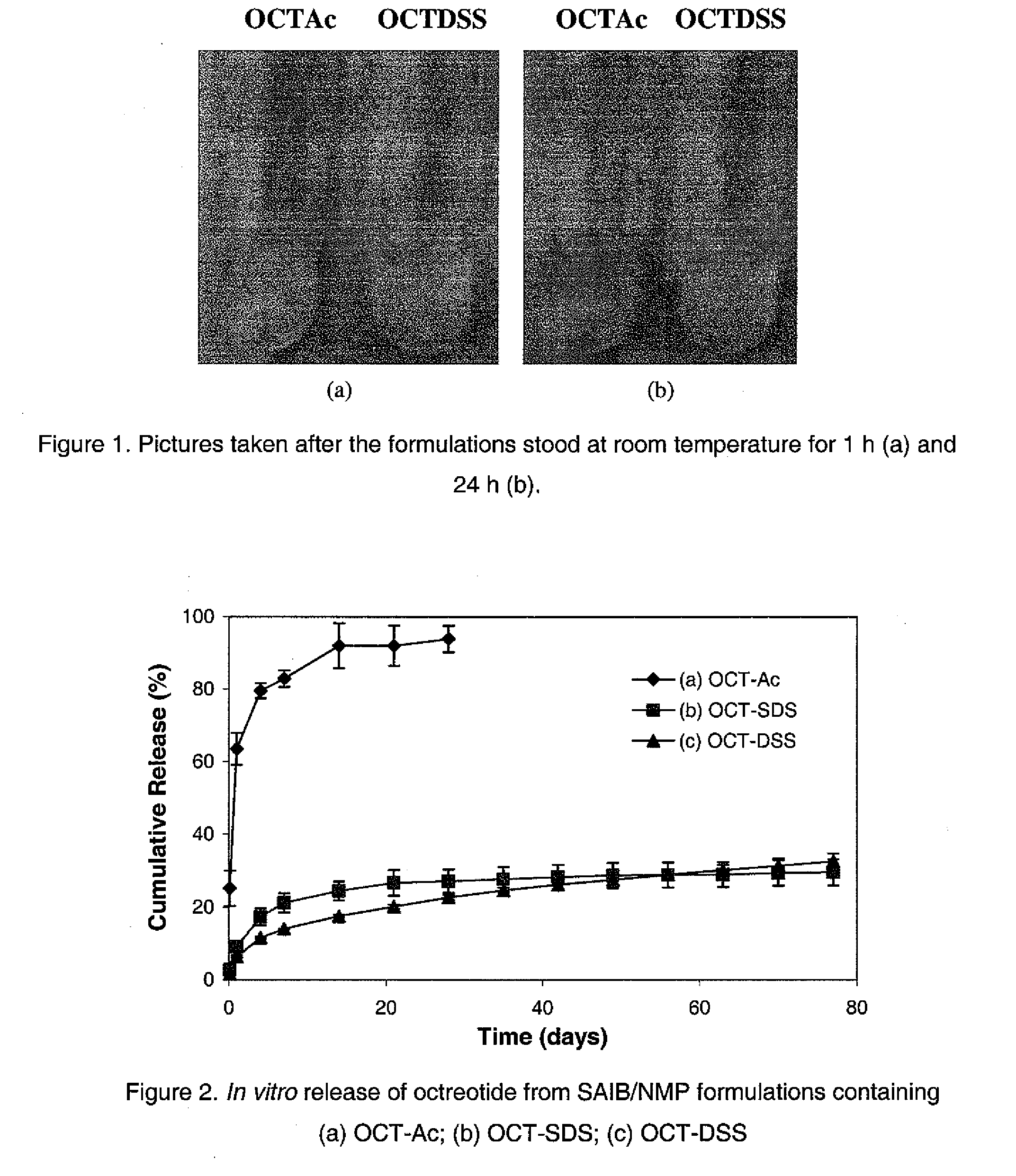Non-Polymeric Compositions for Controlled Drug Delivery
a technology of polymer compositions and controlled drugs, which is applied in the direction of peptide/protein ingredients, antibacterial agents, and metabolic disorders, can solve the problems of reducing the burst effect, reducing the chemical degradation rate, and reducing the burst rate, so as to prevent or minimize the phase separation, maintain the physical stability of the formulation, and prevent or minimize the effect of chemical degradation
- Summary
- Abstract
- Description
- Claims
- Application Information
AI Technical Summary
Benefits of technology
Problems solved by technology
Method used
Image
Examples
example 1
Preparation of Formulation Containing Octreotide Acetate and In Vitro Release
[0049]A solution of sucrose acetate isobutyrate (SAIB) in N-methyl-2-pyrrolidone (NMP) at a concentration of 80% by weight was prepared by combining 2 g NMP with 8 g SAIB followed by gentle mixing. A clear, low viscosity solution was obtained. Then 60 mg octreotide acetate was dissolved in 100 μL NMP which was combined with 900 μL SAIB solution in NMP (80%) and mixed well to obtain a formulation containing about 6% of octreotide acetate.
[0050]About 0.1 mL of the octreotide formulation was injected into 3 mL of releasing buffer (PBS 7.4, containing 0.1% sodium azide) in a glass vial. The vials were incubated at 37° C. and sampled at various time points. At each time point, 2 mL of release medium was removed and 2 mL of fresh release medium added. The release samples were analyzed for peptide concentration and integrity by HPLC using a YMC-Pack ODS-120A column.
[0051]Observation: when 100 μL solution of octreo...
example 2
Preparation of the Complex of Octreotide and Dodecyl Sulfate (OCT-SDS)
[0053]215.2 mg of sodium dodecyl sulfate (SDS, MW 288.38, 98.5%) was dissolved in 20 ml water (10.76 mg / mL, 36.75 mM). 251.7mg (0.212 mmol) of octreotide acetate (MW 1019.2+120 (acetate), 85.8%) was dissolved in water (10 mL). The octreotide solution was mixed with 11.56 mL of the SDS solution to form the complex stoichiometrically. The precipitate was separated by centrifugation and then dried under vacuum.
example 3
Preparation of the Complex of Leuprolide and Dodecyl Sulfate (LA-SDS)
[0054]215.2 mg of sodium dodecyl sulfate (SDS, MW 288.38, 98.5%) was dissolved in 20 mL water (10.76 mg / mL, 36.75 mM). 201.4 mg (0.142 mmol) of leuprolide acetate (MW 1209.4, 85.1%) was dissolved in 10 mL water (14 mM). The leuprolide solution was mixed with 7.619 mL of the SDS solution to form the complex stoichiometrically. The precipitate was separated by centrifugation and then dried under vacuum.
PUM
| Property | Measurement | Unit |
|---|---|---|
| Temperature | aaaaa | aaaaa |
| Temperature | aaaaa | aaaaa |
| Percent by mass | aaaaa | aaaaa |
Abstract
Description
Claims
Application Information
 Login to View More
Login to View More - R&D
- Intellectual Property
- Life Sciences
- Materials
- Tech Scout
- Unparalleled Data Quality
- Higher Quality Content
- 60% Fewer Hallucinations
Browse by: Latest US Patents, China's latest patents, Technical Efficacy Thesaurus, Application Domain, Technology Topic, Popular Technical Reports.
© 2025 PatSnap. All rights reserved.Legal|Privacy policy|Modern Slavery Act Transparency Statement|Sitemap|About US| Contact US: help@patsnap.com


